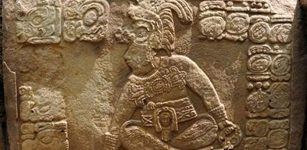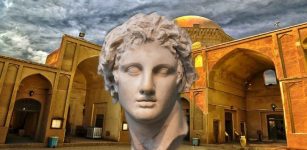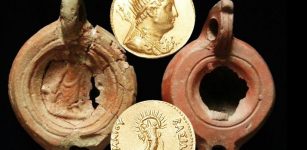Antisthenes And Diogenes – Founders Of Cynicism Were Ancient Greek Philosophers
Ellen Lloyd - AncientPages.com - The concept of cynicism comes from the Greek word for dog ( kynos), but originated in a philosophical school established in ancient Greece.
Denoting their denial of luxuries, wealth, and social status, cynics believe the purpose of life is to live in virtue, in agreement with nature.
Left: Antisthenes, part of a fresco in the National University of Athens. Right: Diogenes of Sinope lived in a barrel in downtown Athens, (by Waterhouse)
This meant satisfying only the most basic requirements of the body by the simplest means possible.
The Cynic School, founded in Athens about 400 B.C., continued in existence until about 200 B.C. The founder of the school was Antisthenes, (c. 445–365 B.C.) a Greek philosopher who was a pupil of Socrates. The best known among his followers is Diogenes of Sinope (c. 412–323 B.C.)
Antisthenes said that desire leads to pleasure and pleasure to the misery of insufficient and temporal happiness. Antisthenes valued virtue more than anything. In his opinion, virtue is the only good, and pleasure is always evil. Self-control is the essence of virtue.
According to his philosophy, wise people learn to above all things to despise material needs and the artificial comforts in which worldly men find happiness.
Self-control, he said, is the essence of virtue, and a wise man will learn above all things to despise material needs and the artificial comforts in which worldly men find happiness. Virtue was according
Nicknamed ‘the dog’ for his vagrant lifestyle, Diogenes was described as ‘a Socrates gone mad’.
Alexander the Great's meeting with Diogenes.
Diogenes took the concept of cynicism to its highest level. Legends tell Diogenes lived in a barrel (actually a kind of storage jar) on the outskirts of the marketplace. He made his living by begging, refusing to wear anything but the simplest of cloth.
Diogenes was sometimes referred to as “Diogenes the dog”, but he was by no means offended by this. To him, it was almost like a compliment because he believed dogs were more in touch with nature. Dogs do not care for social status or material possessions.
The happiest person, who in Diogenes’ phrase “has the most”, is, therefore, someone who lives in accordance with the rhythms of the natural world, free from the conventions and values of civilized society, and is “content with the least”.
Alexander the Great who was his great admirer met the Greek philosopher in Corinth while he was bathing in the morning sunlight. The King of Macedonia asked Diogenes if there was anything he (a man who seemingly had everything) could do for him.
The philosopher responded, “Yes, stand out of my light”. Alexander the Great was said to have been so impressed with the remark that he then stated “If I were not Alexander, I would wish to be Diogenes”.
As a general philosophic principle, cynicism was highly influential upon the later Stoic philosophers.
Written by Ellen Lloyd – AncientPages.com
Copyright © AncientPages.com & Ellen Lloyd All rights reserved. This material may not be published, broadcast, rewritten or redistributed in whole or part without the express written permission of AncientPages.com and Ellen Lloyd
Expand for referencesMore From Ancient Pages
-
 4,500-Year-Old Row Of Giant Monoliths Found – Could Be the Largest In Britain
News | Sep 7, 2015
4,500-Year-Old Row Of Giant Monoliths Found – Could Be the Largest In Britain
News | Sep 7, 2015 -
 Baltinglass Hills: Prehistoric Irish Monuments May Have Served As Pathways For The Deceased – New Evidence
News | Apr 30, 2024
Baltinglass Hills: Prehistoric Irish Monuments May Have Served As Pathways For The Deceased – New Evidence
News | Apr 30, 2024 -
 Baffling Archaeological Find At George Washington’s Mount Vernon
Archaeology | Jun 20, 2024
Baffling Archaeological Find At George Washington’s Mount Vernon
Archaeology | Jun 20, 2024 -
 Castro People: Intriguing Life Of The Female-Dominated Society In Ancient Iberia
Featured Stories | Oct 23, 2024
Castro People: Intriguing Life Of The Female-Dominated Society In Ancient Iberia
Featured Stories | Oct 23, 2024 -
 On This Day In History: Maya King Yuknoom Ixquiac ‘Jaguar Paw Smoke’ Assumes The Crown Of Calakmul – On Apr 3, 686
News | Apr 3, 2017
On This Day In History: Maya King Yuknoom Ixquiac ‘Jaguar Paw Smoke’ Assumes The Crown Of Calakmul – On Apr 3, 686
News | Apr 3, 2017 -
 Unusually Arranged Skeletons And Artifacts Found Inside A 1,500-Year-Old Tomb In Berenice Troglodytica, Egypt
News | May 27, 2022
Unusually Arranged Skeletons And Artifacts Found Inside A 1,500-Year-Old Tomb In Berenice Troglodytica, Egypt
News | May 27, 2022 -
 Peculiar Ancient Ruins That Can Re-Write History Of Florida Found By Archaeologists
Featured Stories | Jul 28, 2024
Peculiar Ancient Ruins That Can Re-Write History Of Florida Found By Archaeologists
Featured Stories | Jul 28, 2024 -
 Mystery Of Zendan-e Eskandar – Alexander The Great’s Prison
Featured Stories | Oct 14, 2020
Mystery Of Zendan-e Eskandar – Alexander The Great’s Prison
Featured Stories | Oct 14, 2020 -
 Mazu: Chinese Goddess Of The Sea – Protector Of Fishermen
Chinese Mythology | Apr 16, 2016
Mazu: Chinese Goddess Of The Sea – Protector Of Fishermen
Chinese Mythology | Apr 16, 2016 -
 Millennial Pre-Colonial Cultural Influence Is Evident In The Amazon Forest
Archaeology | Jun 28, 2020
Millennial Pre-Colonial Cultural Influence Is Evident In The Amazon Forest
Archaeology | Jun 28, 2020 -
 Suomenlinna Fortress: Impressive ‘Castle Of Finland’ Has Rich History
Featured Stories | Feb 13, 2016
Suomenlinna Fortress: Impressive ‘Castle Of Finland’ Has Rich History
Featured Stories | Feb 13, 2016 -
 Rare Magic Mirror In Cincinnati Museum Has A Secret Hiding In Plain Sight
Artifacts | Jul 19, 2022
Rare Magic Mirror In Cincinnati Museum Has A Secret Hiding In Plain Sight
Artifacts | Jul 19, 2022 -
 Artificial Intelligence Recreates Pompeii’s Ruined Ancient Masterpieces
Archaeology | Jul 8, 2023
Artificial Intelligence Recreates Pompeii’s Ruined Ancient Masterpieces
Archaeology | Jul 8, 2023 -
 New Method Distinguishes Between Egyptian And Palestinian Glass During Roman Times
Archaeology | Jul 13, 2020
New Method Distinguishes Between Egyptian And Palestinian Glass During Roman Times
Archaeology | Jul 13, 2020 -
 Scientists Unravel Secrets From Ancient Latin Papyrus And Shed New Light On The Roman World
News | Jan 11, 2023
Scientists Unravel Secrets From Ancient Latin Papyrus And Shed New Light On The Roman World
News | Jan 11, 2023 -
 Impressive Huge Ancient Lamassu Statue Unearthed In Nineveh, Iraq
Archaeology | Oct 28, 2023
Impressive Huge Ancient Lamassu Statue Unearthed In Nineveh, Iraq
Archaeology | Oct 28, 2023 -
 Greco-Roman Bath Complex, Coin Depicting King Ptolemy III And Other Artifacts Found In Egypt’s Gharbia Province
Archaeology | May 26, 2018
Greco-Roman Bath Complex, Coin Depicting King Ptolemy III And Other Artifacts Found In Egypt’s Gharbia Province
Archaeology | May 26, 2018 -
 Astonishing Secrets Of Legendary Kachinas: Watchers Of The Hopi
Civilizations | Apr 8, 2017
Astonishing Secrets Of Legendary Kachinas: Watchers Of The Hopi
Civilizations | Apr 8, 2017 -
 The Amarna Letters: Diplomatic Correspondence In Ancient Egypt
Artifacts | Apr 27, 2016
The Amarna Letters: Diplomatic Correspondence In Ancient Egypt
Artifacts | Apr 27, 2016 -
 12,000-Year-Old Stones Found In Israel Could Be Earliest Evidence Of Wheel-Like Technology
Archaeology | Nov 13, 2024
12,000-Year-Old Stones Found In Israel Could Be Earliest Evidence Of Wheel-Like Technology
Archaeology | Nov 13, 2024


